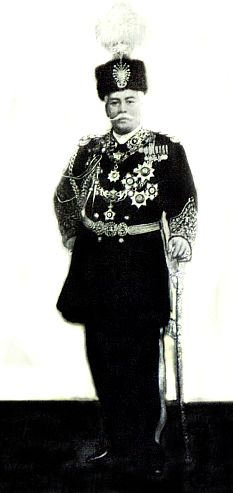The
word Johor is taken from the Arabic word, 'Jauhar', which literally
means 'Precious Stones'. This illustrates the influence of the early
Arab traders who traded spices in Johor.
 |
| precious stone |
The history of modern Johor began with Dato'
Temenggong Daing Ibrahim, the son of Temenggong Abdul Rahman who was a
descendant of Sultan Abdul Jalil IV of Johor.
 |
| Dato' Temenggong Daing Ibrahim |
Dato' Temenggong Daing Ibrahim maintained the seat of government
at Teluk Belanga in Singapore but also begs to develop Tanjung Puteri in
Johor. His reign saw the opening of land to Chinese settlers from
Singapore for the cultivation of pepper, a move that boosted the economy
of the state.
The Temenggong was succeeded by his son,
Dato' Temenggong Abu Bakar who later took the title Seri Maharaja Johor.
Temenggong Abu Bakar continued his father's efforts in cultivating
friendly relations with the British. In 1866, he was formally crowned
Sultan of Johor, a feat that earned him the title of 'Father of Modern
Johor'.
 |
| Dato' Temenggong Abu Bakar |
He gave Johor its constitution and developed an efficient system
of administration. The moving of the seat of government from Teluk
Belanga to Tanjung Puteri (renamed Johor Bahru) in 1841 led to the rapid
development of the town as government offices, police stations, mosques
and court houses were built. The Istana Besar constructed during his
reign became the official residence of the Sultan.
His successor, Sultan Ibrahim, continued
to maintain close relations with the British and in 1910, requested for
the services of a British advisor to counsel him on matters of state.
Under the able administration of Sultan Ibrahim and his successors,
Johor continued to thrive and prosper.
 |
| Sultan Ibrahim |
In 1941, the peninsula fell under
Japanese occupation and joined the Federation of Malaya in 1948. During
World War II, Johor Bahru became the last city on the Malay peninsula
to fall to the Japanese. General Yamashita Tomoyuki had his headquarters
on top of Bukit Serene and coordinated the downfall of Singapore.
After
independence in 1957, Malaysia has evolved into a combination of
constitutional monarchy and parliamentary democracy. Johor is now a
prosperous state with an expanding economy, fueled by agriculture,
manufacturing, commerce and tourism.
 |
| The scene of Johor nowadays |

No comments:
Post a Comment